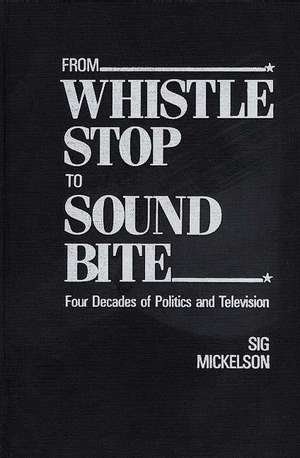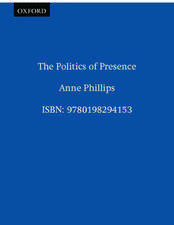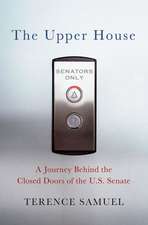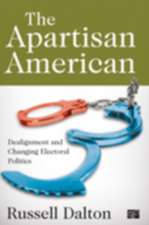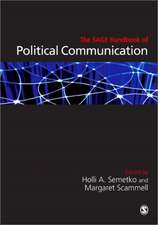From Whistle Stop to Sound Bite: Four Decades of Politics and Television
Autor Sig Mickelsonen Limba Engleză Hardback – 31 iul 1989
Sig Mickelson, former president of CBS News and pioneer in television coverage of political events, gives an eyewitness account of Television's complicated interaction with the U.S. political system. From Whistle Stop to Sound Bite explores the origins of the relationship between television and politics and offers an analysis of the factors that led to the decline of substance in the political campaign. With a fine eye for detail and many years of political coverage experience behind him, Mickelson probes four decades of TV history and defines the changes that this new media has wrought on the political scene. Television and politics would seem to have been made for each other, Sig Mickelson was there as a major figure at their first meeting. It might be said he introduced them. Here is his carefully documented account of their frequently stormy courtship--and his cogent analysis of the flaws and dangers in the unbreakable marriage. The book is fascinating, profound, and important. "Walter Cronkite"
... a superb and useful study that substantially informs our understanding of the role of television and modern politics. "Everette E. Dennis"
... an important book--filled with insight, wisdom, and value.
"Newton Minnow"
Sig Mickelson, former president of CBS News and pioneer in television coverage of political events, gives an eyewitness account of television's complicated interation with the U.S. political system. "From Whistle Stop to Sound Bite" explores the origins of the relationship between television and politics and offers an analysis of the factors that led to the decline of substance in the political campaign. With a fine eye for detail and many years of political coverage experience behind him, Mickelson probes four decades of TV history and defines the changes that this new media has wrought on the political scene: bright hopes for debate that were dimmed as candidates took control of the media machinery; the weakening of the party structure as television, rather than the party, became the candidate's link with the public; and the decline of the convention.
Mickelson recounts events from the days of early television when the fledgling medium was testing the political waters, eventually opting for full immersion. By placing the origins of television's relationships with politics and politicians under close surveillance, writes Mickelson, we may equip ourselves with better tools to assess the merits and weaknesses of the present system and to better analyze proposed remedial measures. Professional and student journalists, communications specialists, political managers, candidates and potential candidates as well as the general reader interested in television and politics will find valuable information here about television's indelible mark on the U.S. political system.
| Toate formatele și edițiile | Preț | Express |
|---|---|---|
| Paperback (1) | 176.02 lei 43-57 zile | |
| Praeger – 31 iul 1989 | 176.02 lei 43-57 zile | |
| Hardback (1) | 347.10 lei 43-57 zile | |
| Praeger Publishers – 31 iul 1989 | 347.10 lei 43-57 zile |
Preț: 347.10 lei
Preț vechi: 477.07 lei
-27% Nou
66.43€ • 69.17$ • 56.14£
Carte tipărită la comandă
Livrare economică 10-24 martie
Specificații
ISBN-10: 0275923517
Pagini: 196
Dimensiuni: 158 x 248 x 21 mm
Greutate: 0.52 kg
Editura: Praeger Publishers
Descriere
… a superb and useful study that substantially informs our understanding of the role of television and modern politics. Everette E. DenniS≪/i>
… an important book--filled with insight, wisdom, and value.
Newton Minnow
Sig Mickelson, former president of CBS News and pioneer in television coverage of political events, gives an eyewitness account of television's complicated interation with the U.S. political system. From Whistle Stop to Sound Bite explores the origins of the relationship between television and politics and offers an analysis of the factors that led to the decline of substance in the political campaign. With a fine eye for detail and many years of political coverage experience behind him, Mickelson probes four decades of TV history and defines the changes that this new media has wrought on the political scene: bright hopes for debate that were dimmed as candidates took control of the media machinery; the weakening of the party structure as television, rather than the party, became the candidate's link with the public; and the decline of the convention.
Mickelson recounts events from the days of early television when the fledgling medium was testing the political waters, eventually opting for full immersion. By placing the origins of television's relationships with politics and politicians under close surveillance, writes Mickelson, we may equip ourselves with better tools to assess the merits and weaknesses of the present system and to better analyze proposed remedial measures. Professional and student journalists, communications specialists, political managers, candidates and potential candidates as well as the general reader interested in television and politics will find valuable information here about television's indelible mark on the U.S. political system.
